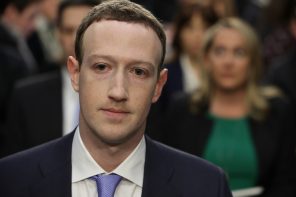In the United States, where the sitting President refers to the press as the “enemy of the people,” extreme polarization, partisan echo chambers, and public mistrust have recently characterized news media. As social media and rapidly changing political landscapes breed increasingly polarized opinions across the world, consumers of Canadian journalism wonder whether the same applies here.
At the McGill Faculty Club on October 30, experts analyzed the current and future state of North American news media during the panel discussion, “Responsible Journalism in the Age of Hyper-Polarization,” in connection with the Max Bell School of Public Policy. Moderated by Professor Andrew Potter, the panel included: Jennifer Ditchburn, Editor-in-Chief of Policy Options; Philippe Gohier, head of VICE Quebec; and Mark Lloyd, former associate general counsel at the U.S. Federal Communications Commission.
Potter began by discussing an article he co-wrote, published the same day in Policy Options, What do Canadians want from their news? The article contains a survey about political leanings and news consumption for Canadians, revealing that the scope of political opinions and amount of biased media consumed in Canada is no less varied between citizens than it is in the U.S. However, Canadians tend to trust media more than their American counterparts, and seem to generally agree on a set of basic, core facts about the world, with “little sense of the ‘alternative facts’ rhetoric” that permeates American debate over media.
Lack of trust in the news can stem from a sense that one’s political views are underrepresented. To preserve journalistic integrity, reporters often attempt to give each side equal voice. However, some criticize these efforts for causing a phenomenon that Potter referred to as “truth decay”: too much balance at the expense of objective facts. Therefore, the question stands: how should journalists proceed while covering divisive events and far-right and far-left opinions?
Gohier described his general rule for responsibly covering extremist groups. Firstly, “the group or individual’s ideas have to transcend the community and enter mainstream politics or other activism,” secondly, “the journalist must understand the context of radicalization, and lastly, the “reader must quickly and clearly understand the ties this group’s opinions have to a larger political debate.”
Last May, VICE Quebec experienced this tension first-hand when members of Atalante, a far-right group with racist ideologies, stormed their Montreal newsroom with the goal of intimidating journalists. The group threw papers and played loud music, disrupting the office space but causing no physical violence. Gohier discussed being faced with questions following the event such as, “How do we cover this without exacerbating tension with the far-right or becoming a political player in the criminal court?”
Often, there is no universal guideline. “Any coverage that we give will amplify their views,” Gohier said. “It’s in the nature of what we do and, in fact, it is the purpose of what we do. We can’t control how people will react to…what we write. We’re not ultimately able to constrain those reactions.”
Lloyd explained that in his career at CNN in the 1980s, extremist minority groups were so small and private that they were simply not deemed “worth the time and resources” required to cover them. Today’s journalists, however, are no longer the gatekeepers of truth. “We’re dealing with a completely different context than we were 20 years ago, when we could all collectively decide that no one was going to hear about this,” Ditchburn said. Now, both politicians and radical political factions have direct online links with the public. This ranges from influential, large-scale figures such as U.S. President Donald Trump through Twitter, to extremist subcommunities through platforms such as Reddit and 4Chan.
To counter over-exposure of polarizing opinions, Lloyd emphasized thorough fact-checking. “[Journalism] is inherently incomplete; on the run; imperfect. It is called the ‘first draft of history’, and it is really not trustworthy unless you go and double check,” he said, encouraging the audience to ask journalists, “To what extent are you able to pierce the veil of respect and present something that’s true and puts the words in context?”
According to Lloyd, the press themselves also require a check from other media and the consumers. Some modern journalists have suggested explicitly stating their own biases in anything published. “Balance and fairness are a key component of journalism,” Ditchburn asserted, describing literally counting the number stories published about each political party running in any given election. She suggested better training on “how to read data…and know if statistics are faulty.”
“It’s in the nature of what we do and, in fact, it is the purpose of what we do. We can’t control how people will react to…what we write. We’re not ultimately able to constrain those reactions.”
In the era of former Prime Minister Stephen Harper, Ditchburn remembered a sense of frustration with the press focus on “every single photo-op and mistake,” calling this a “waste of time” that was neither deep nor profound. Today, with President Trump, “this is amplified by a million.”
Gohier pointed out a further issue in directing massive amounts of attention to the U.S. President. “Trump’s point of saying falsehoods is to have them debunked by the media, and then point to his allies and say that all the coverage is critical and has a globalist consensus.” Therefore, modern journalists have become “stuck in an almost impossible limbo,” he said.
To counter mistrust and polarization in Canadian media, Ditchburn proposed supporting government funding for “journalism that does not hinge completely on advertising or commercial interests,” an area in which the U.S. is particularly lacking. Potter’s aforementioned study suggested that many Canadians, even those who regularly read the news, favor diversity of opinion and competition in the press, yet disagree with motions to increase funding for the Canadian Broadcasting Corporation (CBC) and smaller, failing public organizations. “Should the audience blindly trust journalists?” Lloyd asked, answering: “Absolutely not!” He explained that “support for operations like the CBC can set a standard for how the commercial publications operate.”
“Many of the challenges we’re having in journalism are structural problems. They are public policy problems. These are problems that stem from what we decide in our society about the kind of journalism we want,” Lloyd said. “I believe in democracy, and I don’t know how you get there without democratic institutions supporting journalism.”
Despite sensing danger in being a journalist, Lloyd explained, “If there was ever a time we needed an independent, robust press, it is now. Despite all the things that the press might be…we need it more than ever to count the number of lies, call them lies, and be upfront and honest about it.”








